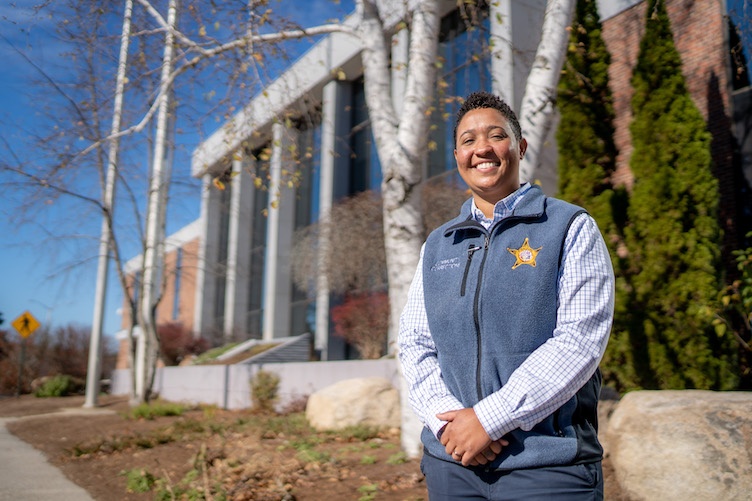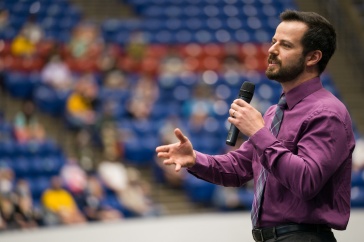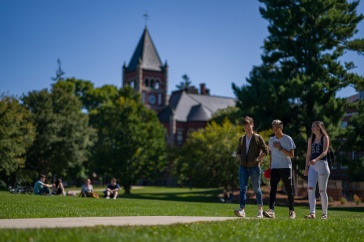
With nearly two decades of experience in the justice system, Blair Rowlett ’05 says she’s learned a lot about “the complicated and often tragic relationship between mental illness and criminality.”
Rowlett began her career as a correctional officer at the Strafford County Jail, where she spent enough time with inmates to learn their stories, to hear how they ended up where they were.

This story appears in the Summer 2023 edition of UNH Magazine, which is live online now. Visit magazine.unh.edu to explore the complete issue.
Then, in 2006, something happened. Opening a cell door, she was attacked by three inmates: one lunged at her, while another blinded her temporarily with what turned out to be Ajax powder. Suddenly, another inmate was lifting her off the floor. After a serious struggle, she was able to finally reach her shoulder mic to call for help.
Help came, and Rowlett recovered. But the incident changed her — and what she focused on were not the three men who attacked her, but the other inmates who weren’t involved, offering her support.
“One of the other inmates jumped up when she saw me and started crying, ‘Rowlett, are you OK? I was so worried. I was banging on the cell and screaming for help!’” she recalls.
Rowlett discusses her work and that 2006 incident in a new collection of essays, edited by UNH faculty member Katherine Gaudet, “What Is a Criminal?”
“That incident helped me realize that I liked the field of criminal justice, but I wanted to do more to help those inmates, and the only way to really do more is to do it in the community,” Rowlett says.
Part of that work was trying to break the cycle of the “revolving door” where people are incarcerated and then freed, only to re-offend and be re-incarcerated. After nearly two years as a corrections officer, she became a community corrections pretrial officer, helping people comply with release conditions to stay out of jail. Since 2011, she’s been the director of the Mental Health Community Supervision Programs for Strafford County, addressing the intersection of mental illness, substance misuse and criminal activity.
She meets with every Strafford County inmate with a mental health diagnosis to determine if they are appropriate for community supervision. In addition to breaking that revolving door phenomenon, successfully setting up those inmates with stable housing, mental and medical healthcare and other support reduces the strain on the court system and, ultimately, on taxpayers.
“When you are taught that you deserve a seat at the table, and you truly believe it because you believe in yourself, no one can tell you otherwise.”
Rowlett was born in Nashua but grew up in Atlanta, returning to New Hampshire for summer vacations. She was a two-time All-American in lacrosse, but when athletic scholarship money dried up, she was a freshman trying to figure out a way to pay for college. “I was that broke college kid; I looked for scholarships, grants, loans, whatever I could do to afford it,” she remembers. “I was meeting great people, loved the classes I was taking and the friends I was making, so I couldn’t leave.”
When UNH created the Justice Studies program, her interest was piqued: she wanted to work in criminal justice. On campus, she was a regular resident in the Office of Multicultural Student Affairs, now The Beauregard Center, as a place “where I could see people who looked like me, who thought like me, where I found the LGBT group on campus, where I was around other people who wanted to be active on campus, helped me feel good about being at UNH.”
She became a CONNECT program mentor her sophomore year and shared with a group of mentees something personal: “I stood up and said ‘Hey, just so you know, I’m gay; if anyone wants to talk about it, you can come talk to me after this.’” A young woman who had been struggling to come out to her parents sought Rowlett’s counsel, and the two formed a friendship that continues today.
“UNH is so great about offering those bubbles of comfort for kids like me and like her who really need it. CONNECT definitely started me off on the right foot and allowed me to dive into the college experience and not feel so out of place,” Rowlett says. “I didn’t have one bad experience at UNH.”
Her attitude of openness combined with determination has always been part of her identity, says Rowlett — and has served her well in her career in criminal justice, historically a male-dominated field.
Growing up as a biracial child, she heard things suggesting she was neither “Black enough” nor “white enough.” Those comments planted a seed: “I didn’t fit into one group, so I learned to accept and love who I was at a young age.” A big part of that confidence comes from her parents. “They always let me be myself; they supported me, which made me more confident in everything I did.
“When you are taught that you deserve a seat at the table, and you truly believe it because you believe in yourself, no one can tell you otherwise.”
-
Written By:
Michelle Morrissey ’97 | UNH Magazine | michelle.morrissey@unh.edu



















































